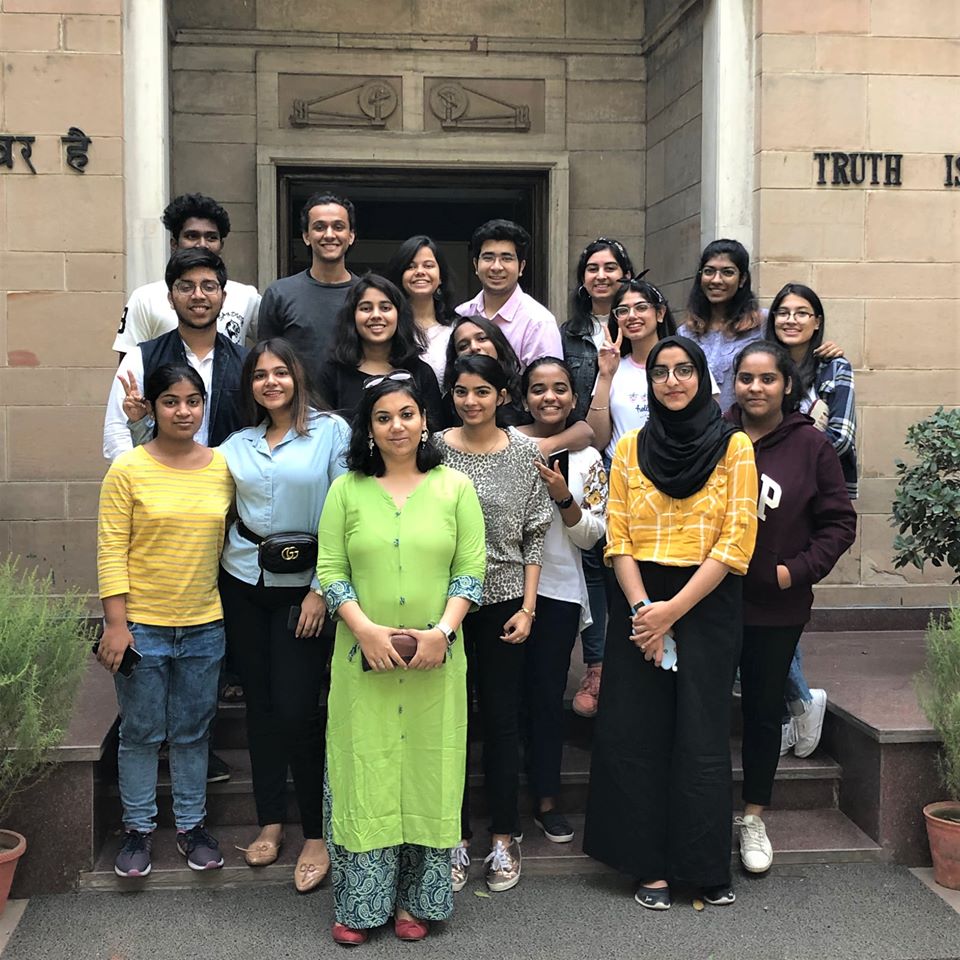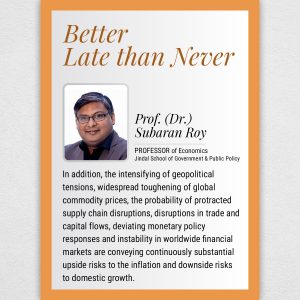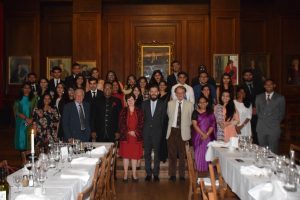Indian-American economist Prof. Abhijit Banerjee, Prof. Esther Duflo and Prof. Michael Kremer won the Nobel Prize in Economics last year—the Sveriges Riksbank Prize in Economic Sciences in memory of Alfred Nobel, to be precise—for their experimental approach to alleviating global poverty. For young Indian students interested in economics, it was an inspiring moment. That is the kind of impact the study and application of economics can have. Yes, it is possible to truly make a difference in the world. And yes, the quest for academic excellence and research can lead the way there.
The launch of the O.P. Jindal Global University’s new two-year M.A. Economics programme came around the same time as the Nobel news. While there are a wide array of mainstream economics degrees to choose from in India, the one offered at the Jindal School of Governance and Public Policy, packs something different.
- The programme is offered at a public policy school, which means exposure to actual policy-making process and practical insights
A degree in economics is obviously useful. You could go on to become an economist; work in public policy, civil services, financial or investment analysis, accountancy, business or data analysis; find jobs at banks, consultancies, insurance firms, NGOs, research groups, think tanks, or governments.
You can go into the depths of the discipline, learn all the theories and principles, but having a close connection with one of the most relevant applications of the subject is a rare opportunity. This is a remarkable chance for people who’re looking to leverage an economics degree to enter the realm of policy.
Unlike typical postgraduate economics programmes, JSPG’s brings in a strong focus to the actual policy making process. Students will gain insights from economics that are applicable in public policy design, implementation, analysis, and evaluation.
- Study economics at a multidisciplinary university
“Interdisciplinarity is a form of pedagogy that’s rather recent. But at the same time, it’s rather ancient. Adam Smith, who is regarded as the ‘founder’ of economics, wrote a book called ‘The Wealth of Nations’. He was also a philosopher. So another very important book he wrote is ‘The Theory of Moral Sentiments’. He didn’t differentiate in his mind that there’s a discipline like economics, another like philosophy, or even one like law,” explains Prof. Sudarshan Ramaswamy, Dean, JSGP, elaborating on the intrinsic interdisciplinarity of economics.
Multidisciplinarity has been long since entrenched in the best of western universities like Harvard, Stanford or Yale. Now, the education landscape in India is also adapting to the inspiring success of this model. Especially through ambitious young institutions like JGU, the approach to higher education is reshaping in a multidisciplinary way.
“In economics, there is the concept of an ‘economic man’, who is supposed to maximise his utility and act rationally. Now this is an artificial creation because no one is really an economic man. So for certain inferences of human behaviour, say the law of supply and demand, you may posit a hypothesis or an assumption, but you still don’t get a good grasp of how human beings behave as economic agents if you entirely based your discipline on an assumption that’s not well-founded. You need a more holistic understanding. And that’s the basis of our quest for interdisciplinarity. Your knowledge base must draw insights from a number of disciplines,” believes Prof. Ramaswamy, emphasising the importance of an interdisciplinary education.
- Strong training in qualitative as well as quantitative analysis
‘Game Theory’ is arguably one of the most fascinating subjects for young people studying economics. Even to simply define the concept is a complicated task—and there’s nothing more exciting to sharp, young minds than a good challenge!
So you can only imagine the kind of intellectual stimulation—not to forget, the mathematical intensity—it offers. How do people make decisions? Answering this all-important question by mathematically and logically analysing how independent decision-makers act in games—this ‘science of strategy’—surely makes for captivating classroom discussions. If you’ve enjoyed dabbling in game theory at the undergraduate level, you can look forward to two core papers on the subject in the M.A. Eco programme.
Beyond deeper theoretical understanding of economics needed at the postgraduate level, the programme focuses on solving real-world problems. There is also a strong emphasis on monitoring and evaluating development interventions. This requires analysis at every stage. From game theory and mathematical and statistical tools to understanding human behaviour, logic and communication, learning how to analyse problems, gather data, organise, interpret, and evaluate it, propose predictions, and come up with solutions to solve problems of the economy is covered every step of the way.
- Faculty with the best of academic, research and professional backgrounds
As economies across the globe grow more complex, interconnected and uncertain, nurturing an interdisciplinary perspective can go a long way. In order to learn to make those connections, you need capable mentors. This is where the experience and expertise of faculty really matters at any institution.
For instance, studying the economics of the changing socio-political context worldwide is an interesting prospect. At JGU, you’ll find the likes of Professor Swagato Sarkar, who draws from political theory, sociology and political economy in his teaching and research—a true ‘interdisciplinarian’. Or Prof. Rajeev Malhotra, who has worked with the Government of India, Planning Commission, the United Nations and as a consultant to many international organisations before joining JSGP. Students can make the most of his insights from the field, particularly his work in human rights and development, which is a pertinent issue today.
This is the kind of experience and expertise available to students at JGU. Faculty come from the best of global institutions. They are actively engaged in interdisciplinary research themselves, bringing in cutting-edge domain knowledge to their pedagogy. Many have done significant work in the field, be it through academic contributions or professional work.
- Exposure to the latest developments and research in the discipline
At JGU, learning is contemporary, dynamic and deep. Through lectures, tutorials and focussed group discussions, the latest developments, debates and research in the discipline are woven into classroom discussions. More critically, perhaps, so are other issues.
For instance, talking about coronavirus, or COVID-19, is important today. Not just from a healthcare point of view, but considering its impact on the global economy. To understand the multidisciplinarity of the global context, it’s needed to stay abreast of current affairs even beyond domain-specific topics.
The two-year programme covers 12 core courses on Microeconomics, Macroeconomics, Statistics, Mathematical Methods for Economics, Computational Methods for Economic Analysis, Game Theory, Development Economics, Econometrics and Indian Economy. Students can choose six electives from a number of theoretical and applied courses centred around new and emerging areas of economics.
As a research-driven university, opportunities for student-led research are galore. As part of the programme as well, students will work on a final-year dissertation. Faculty will give one-on-one guidance. As an alternative to the dissertation, one can also choose to do two additional electives.
- JGU has excellent linkages with government organisations, corporations, consultancy companies and NGOs, as well as collaborations with top global institutions for higher education
A major advantage of studying at a university of global repute like JGU is the access if offers to an impressive network. JGU has consciously forged collaborations with organisations related to the fields of study at different schools—in this case, focussing on, governments at national, state and local levels, consultancy companies, non-profit organisations, NGOs, policy sectors and think tanks.
Students who want to specialise and study further can make use of the university’s extensive global collaborations with the best of higher education institutions. This measure of exposure and opportunity is one of the reasons young students today are realising the immense potential of private universities like JGU with strong industry and academic connections.
Admissions & eligibility
Admissions to the programme commencing on 1st August 2020 are now open. Students must have a bachelor’s degree in Economics or any other social science subject; or in Statistics, Physics, Mathematics, Commerce, Business and Engineering. Interested candidates must fill an online application form – http://jsgp.edu.in/ – and take the online JGU Entrance Test. This will be followed by a personal interview. Scholarships are awarded taking into account evidence of merit and means after a personal interview.





